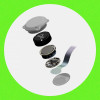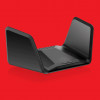Waterproof lithium-air batteries offer 10 times more capacity
A company based in Berkeley, CA, is developing lightweight, high-energy batteries that can use the surrounding air as a cathode. PolyPlus is partnering with a manufacturing firm to develop single-use lithium metal-air batteries for the government, and it expects these batteries to be on the market within a few years. The company also has rechargeable lithium metal-air batteries in the early stages of development that could eventually power electric vehicles that can go for longer in between charges.
Interest in lithium metal-air batteries has been growing in recent years, along with the demand for lighter power sources for devices ranging from plug-in hybrid vehicles to laptops. In lithium-ion batteries, the electrodes are made of materials such as graphite, while in a lithium-metal battery, the anode is made up entirely of lithium metal, and the surrounding air can act as the cathode.
Lithium-metal batteries approach the energy density of fuel cells without the plumbing needed for these devices; in theory, the maximum energy density is more than 5,000 watt-hours per kilogram, or more than 10 times that of today's lithium-ion batteries. Lithium metal-air batteries are also very lightweight because it's not necessary to carry a second reactant. Lithium metal is "the holy-grail battery material," says Steven Visco, chief technical officer and founder of PolyPlus.









































































